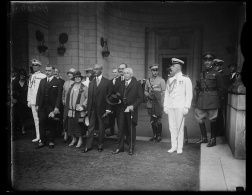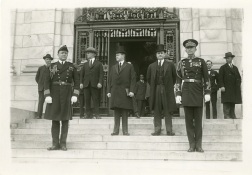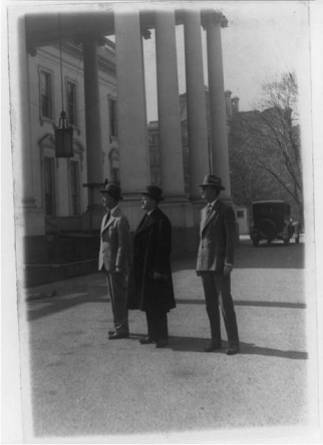
Mr. Bob Kanehl for Manchester, Connecticut’s Journal Inquirer, has recently featured one of the most illustrious Cheneys of the Manchester region of that state who played a very public part in American history. His family is known for many generous legacies in that area but one of its most unsung is national service. Perhaps this Cheney’s quiet and regrettably forgotten role will receive a measure of long-delayed recognition. He is Army Colonel and West Point graduate Sherwood Cheney, who served as a military aide for President Calvin Coolidge.
Colonel Cheney’s life is quite a remarkable one and we render our salute not only to the faithful Colonel but also to the commendable efforts underway to remember him and the many selfless men and women who faced the War that was thought would end them all. It was, after all, the one that not only took most of a generation, leaving cavernous marks not merely on the land but across countless human lives, leaving all who experienced it forever imprinted by its unprecedented material and psychological devastation. It was as much a spiritual conflict as a material one (as all wars are), and yet it came to America, still so much younger than the Old World, at a time when she seemed ready to shoulder the burden. It came with an intangible price but she also met that price squarely and unflinchingly, when it could have been far easier to pass the hard decisions to posterity.

Colonel Cheney’s generation demonstrated that sacrifice and obedience are not things to cynically scorn or treat with lip service allowed only in the mythical safe spaces of sublime feeling or personal convenience. They did not confuse the love due one’s neighbor with an unending permission to abuse or be abused as suited the ignorance, envy or cruelty of others. Neither was this summons to sacrifice a communal passing-of-the-buck to assume the entire weight of the burden only each one (and each nation) must bear alone, if freedom meant anything at all. The notion of equality did not contain some right to demand of others what you were unwilling to give yourself. Respect and honor were not hostile to happiness as if they were vestigial cargo from an unenlightened age. They were integral to fulfillment, something far more substantial than personal happiness. No, respect was not a privilege to be taken but an honor to be given.
Colonel Cheney and his contemporaries did not dismiss the faintest patriotic fervor as born of a sentiment that could only be possible under coercion, delusion or hypocrisy. Patriotism was something to share but it was authentic and often spontaneous, not cloistered in fear of social or cultural recrimination. They were expressions of which all could partake whether around the town square or beneath the Capitol dome itself. And most importantly, that generation did not fail to understand the difference between standards and ideals. They knew there were common qualities, a shared nature of humanity, that mankind (in the universal sense in which it had been understood for millennia) fell well below ideals constantly. Doing so no more discredited the dignity of those aspirations than it required the surrender of higher standards or the persistence to get up and start again. Such was the task and the joy of life. It was not someone else’s conscience to bear or life to answer for, it was your own. The practical application of sacrifice with obedience and the giving of respect with honor remain the only enduring things that bring us back out of all the counterfeit escapes and cheap imitations to genuine reality.
Here is to Colonel Cheney and that greater generation!







